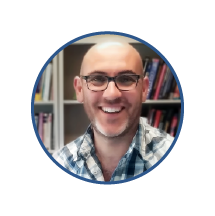|

|
DR. RAMIRO BERARDO
NOVEMBER MEMBER OF THE MONTH
The Ohio State University
School of Environmental & Natural Resrouces
Member since 2004
|
WHY DID YOU BECOME A POLITICAL SCIENTIST?
My interest in politics started at an early
age. I'm originally from Argentina and the country went through a brutal
dictatorship in the 70s that ended with the return to democracy in 1983, when I
was 9 years old. I remember people arguing very passionately about politics in
83, and my dad and grandfather being particularly active (they were longtime
supporters of the Radical Civil Union, which ended up beating the Peronistas in
that election). So I really learned to love politics at an early age and in fact
6 years later I got pretty immersed in the campaign leading to the 1989
presidential elections. My party lost that time, and it was later discovered
that the candidate I had supported so fervently (a former governor) had been
involved in some pretty big corruption cases. Anyway, it was about then that I
decided that I was going to become a political scientist. I didn't want to be
"caught off guard" again, so to speak. I was 15.
WHY DID YOU JOIN APSA AND WHY DO YOU CONTINUE TO STAY INVOLVED?
I think that if you
call yourself a political scientist in the U.S. you HAVE to be a member of
APSA. In addition to having access to the great services the association
provides, being a member of APSA simply helps you build your community of
colleagues and friends in the discipline. There are fewer things that I enjoy
more than the annual conference, when I run into old friends that I wouldn't
see otherwise.
WHAT IS THE MOST CHALLENGING ASPECT OF BEING A POLITICAL SCIENTIST?
Explaining what a
political scientist is to people who don't know anything about political
science (and of course that includes family and friends). I think I gave that
one up sometime back in the early 2000s. Now, when people ask me what I do, I
just say "I teach environmental politics... you know, how people use and
manage water and things like that". It's a very generic statement but I
find that it shortens the conversation to a manageable bit for both every body
involved! And on a more serious note, I would say that a considerable challenge
I have encountered in the profession is that I don't think political science
departments do a particularly good job at training our students to foster
fruitful collaborations across disciplinary boundaries. I work in an
interdisciplinary school myself (the School of Environment and Natural
Resources at The Ohio State University) and I know that there's a lot of value
in what we political scientists do for interdisciplinary teams, but we are
often not great at communicating our strengths and the value of our expertise
to non-political scientists.
IF YOU COULD GIVE ONE PIECE OF ADVICE TO SOMEONE IN THEIR GRADUATE/UNDERGRADUATE YEARS, WHAT WOULD IT BE AND WHY?
In addition to the
obvious "pick the area of work you enjoy, and do the work", I would
say that people should not only accept but embrace the learning potential that
only failure can provide. If you are going to have a productive career, you
will fail more than succeed and you should welcome that, as painful as it may
be sometimes.
OUTSIDE OF POLITICAL SCIENCE, TELL US SOMETHING INTERESTING ABOUT YOURSELF.
I brew my own beer,
and I think that after a few years of less-than-ideal batches (see my comments
on failure in the previous paragraph) I'm starting to produce some pretty
decent brews. I mostly make ales, though I don't shy away from lagers. I'm
currently enjoying the last two gallons of a batch of Oktoberfest that turned
out pretty good if I may say so myself.
